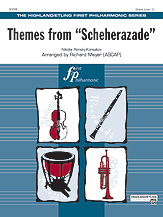Themes from Scheherazade
Buy this item (out of stock)
Product ID: HE1 FP33738
By Nikolai Rimsky Korsakov
Publisher:
Highland Etling
Arranger:
Richard Meyer
Series:
First Philharmonic
Genre:
Romantic Era
Line Up:
Symphony Orchestra
Duration:
4:50
Level: 2
Set & Score
This item is out of stock
About this item
Rimsky-Korsakov's famous symphonic suite "Scheherazade" has been a staple of the symphonic literature since it was first written in 1888. Now your younger students can enjoy this Russian master's colorful orchestrations and imaginative themes in this "true-to-the-original" arrangement. Included are the Sultan's theme, Scheherazade's theme (for solo violin), "The Story of the Kalendar Prince" theme, and "The Young Prince and the Young Princess" themes. With plenty for every section to do, this arrangement is perfect for any concert or as a festival/contest selection.
Instrumentation
1x Conductor score
1x Flute
1x Oboe
1x Clarinet Bb 1
1x Clarinet Bb 2
1x Bass Clarinet Bb
1x Alto Sax Eb
1x Bassoon
1x Horn F
1x Trumpet 1 Bb
1x Trumpet 2 Bb
1x Trombone
1x Tuba
1x Mallet Percussion
3x Percussion
1x Timpani
5x Violin 1
5x Violin 2
3x Violin 3 (Viola TC)
3x Viola
3x Violoncello
3x String Bass
1x Piano Accompaniment ad lib.
Reviews and rating
No review available, be the first to write one!

Composer
Nikolai Rimsky Korsakov (1844-1908)
Nikolai Andreyevich Rimsky-Korsakov (Russian: Никола́й Андре́евич Ри́мский-Ко́рсаков, Nikolaj Andreevič Rimskij-Korsakov, Russian pronunciation: [nʲɪkəˌlaj ˌrʲim.skʲɪj ˈkorsəkəf], 18 March [O.S. 6 March] 1844,[a 1] – 21 June [O.S. 8 June] 1908) was a Russian composer, and a member of the group of composers known as The Five.[a 2] He was a master of orchestration. His best-known orchestral compositions—Capriccio Espagnol, the Russian Easter Festival Overture, and the symphonic suite Scheherazade—are considered staples of the classical music repertoire, along with suites and excerpts from some of his 15 operas. Scheherazade is an example of his frequent use of fairy tale and folk subjects.
Rimsky-Korsakov believed, as did fellow composer Mily Balakirev and critic Vladimir Stasov, in developing a nationalistic style of classical music. This style employed Russian folk song and lore along with exotic harmonic, melodic and rhythmic elements in a practice known as musical orientalism, and eschewed traditional Western compositional methods. However, Rimsky-Korsakov appreciated Western musical techniques after he became a professor of musical composition, harmony and orchestration at the Saint Petersburg Conservatory in 1871. He undertook a rigorous three-year program of self-education and became a master of Western methods, incorporating them alongside the influences of Mikhail Glinka and fellow members of The Five.
More info about the composer...



 Click above to view samples
Click above to view samples
